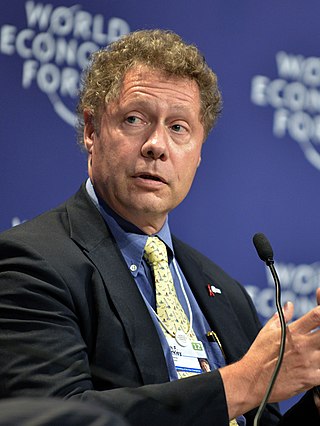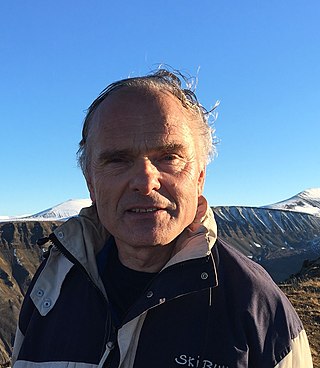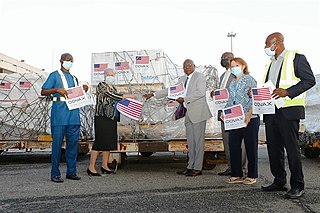An advance market commitment (AMC) is a promise to buy or subsidise a product if it is successfully developed. AMCs are typically offered by governments or private foundations to encourage the development of vaccines or treatments. In exchange, pharmaceutical companies commit to providing doses at a fixed price. This funding mechanism is used when the cost of research and development is too high to be worthwhile for the private sector without a guarantee of a certain quantity of purchases.
Global governance refers to institutions that coordinate the behavior of transnational actors, facilitate cooperation, resolve disputes, and alleviate collective action problems. Global governance broadly entails making, monitoring, and enforcing rules. Within global governance, a variety of types of actors – not just states – exercise power.

An international environmental agreement or sometimes environmental protocol, is a type of treaty binding in international law, allowing them to reach an environmental goal. In other words, it is "an intergovernmental document intended as legally binding with a primary stated purpose of preventing or managing human impacts on natural resources."

The Fridtjof Nansen Institute (FNI) is an independent research foundation specializing in research on international environmental, energy and resource management issues, including political and legal aspects.

John James Kirton is professor emeritus of political science and the director and founder of the G7 Research Group, director and founder of the G20 Research Group, founder and co-director of the Global Health Diplomacy Program, and founder and co-founder of the BRICS Research Group, based at University of Trinity College in the University of Toronto.
David Leonard Downie is an American scholar focusing on international environmental politics and policy. He currently writes and teaches at Fairfield University.

Seth Franklin Berkley is an American medical epidemiologist and a global advocate of the power of vaccines. He is the founder and former president and CEO of the International AIDS Vaccine Initiative (IAVI) and former CEO of Gavi, the Vaccine Alliance. He is currently a senior advisor to the Pandemic Center at Brown University School of Public Health.
Forest genetic resources or foresttree genetic resources are genetic resources of forest shrub and tree species. Forest genetic resources are essential for forest-depending communities who rely for a substantial part of their livelihoods on timber and non-timber forest products for food security, domestic use and income generation. These resources are also the basis for large-scale wood production in planted forests to satisfy the worldwide need for timber and paper. Genetic resources of several important timber, fruit and other non-timber tree species are conserved ex situ in genebanks or maintained in field collections. Nevertheless, in situ conservation in forests and on farms is in the case of most tree species the most important measure to protect their genetic resources.

Iver Brynild Neumann is a Norwegian political scientist and social anthropologist. He is Director of the Fridtjof Nansen Institute at Polhøgda, Lysaker, a position he has held since December 2019. From 2012-2017 he was the Montague Burton Professor of International Relations at the London School of Economics and Political Science. He has also served as Research Director and Director at the Norwegian Institute of International Affairs (NUPI) and adjunct professor in International Relations at the Norwegian University of Life Sciences.
Global Health Initiatives (GHIs) are humanitarian initiatives that raise and disburse additional funds for infectious diseases – such as AIDS, tuberculosis, and malaria – for immunizations and for strengthening health systems in developing countries. GHIs classify a type of global initiative, which is defined as an organized effort integrating the involvement of organizations, individuals, and stakeholders around the world to address a global issue.

Earth system governance is a broad area of scholarly inquiry that builds on earlier notions of environmental policy and nature conservation, but puts these into the broader context of human-induced transformations of the entire earth system. The integrative paradigm of earth system governance (ESG) has evolved into an active research area that brings together a variety of disciplines including political science, sociology, economics, ecology, policy studies, geography, sustainability science, and law.

GAVI, officially Gavi, the Vaccine Alliance is a public–private global health partnership with the goal of increasing access to immunization in poor countries. In 2016, Gavi channeled more than half of total donor assistance for health, and most donor assistance for immunization, by monetary measure.

The Coalition for Epidemic Preparedness Innovations (CEPI) is a foundation that takes donations from public, private, philanthropic, and civil society organisations, to finance independent research projects to develop vaccines against emerging infectious diseases (EID).
Geir Hønneland is a Norwegian political scientist, former Director of the Fridtjof Nansen Institute (FNI) and professor II at the University of Tromsø and Nord University.

Arild Moe is a Norwegian political scientist and Senior Research Fellow at the Fridtjof Nansen Institute in Lysaker, Norway. He has an MSc. from the University of Oslo and has also studied Russian and public law. Moe has been affiliated with the Fridtjof Nansen Institute since 1983 and has been a Guest Researcher at Stanford University and Adjunct Associate Professor at the Norwegian University Center in Saint Petersburg.

The Access to COVID-19 Tools Accelerator, or the Global Collaboration to Accelerate the Development, Production and Equitable Access to New COVID-19 diagnostics, therapeutics and vaccines, is a G20 initiative announced by pro-tem Chair Mohammed al-Jadaan on 24 April 2020. A call to action was published simultaneously by the World Health Organization (WHO) on 24 April. As of January 2022, it was the largest international effort to achieve equitable access to COVID-19 health technologies.

Vaccine development and production is economically complex and prone to market failure. Development is unprofitable in rich and poor countries, and is done with public funding. Production is concentrated in the hands of a small number of powerful companies which acquire key legal monopolies and make very large profits.
Tor Håkon Jackson Inderberg is a Norwegian political scientist and a Senior Research Fellow at the Fridtjof Nansen Institute in Lysaker, Norway. He holds a Master's degree from the Norwegian University of Science and Technology in Trondheim, and a PhD from the University of Oslo. His PhD thesis (2012) focused on the climate change adaptation and governance of electricity sectors in Norway and Sweden.

COVID-19 Vaccines Global Access, abbreviated as COVAX, is a worldwide initiative aimed at equitable access to COVID-19 vaccines directed by the GAVI vaccine alliance, the Coalition for Epidemic Preparedness Innovations (CEPI), and the World Health Organization (WHO), alongside key delivery partner UNICEF. It is one of the four pillars of the Access to COVID-19 Tools Accelerator, an initiative begun in April 2020 by the WHO, the European Commission, and the government of France as a response to the COVID-19 pandemic. COVAX coordinates international resources to enable low-to-middle-income countries equitable access to COVID-19 tests, therapies, and vaccines. UNICEF is the key delivery partner, leveraging its experience as the largest single vaccine buyer in the world and working on the procurement of COVID-19 vaccine doses, as well as logistics, country readiness and in-country delivery.

SCB-2019 is a protein subunit COVID-19 vaccine developed by Clover Biopharmaceuticals using an adjuvant from Dynavax technologies. Positive results of Phase I trials for the vaccine were published in The Lancet and the vaccine completed enrollment of 29,000 participants in Phase II/III trials in July 2021. In September 2021, SCB-2019 announced Phase III results showing 67% efficacy against all cases of COVID-19 and 79% efficacy against all cases of the Delta variant. Additionally, the vaccine was 84% effective against moderate cases and 100% effective against hospitalization.











